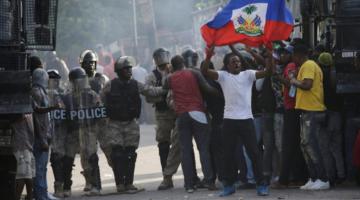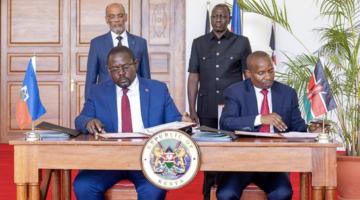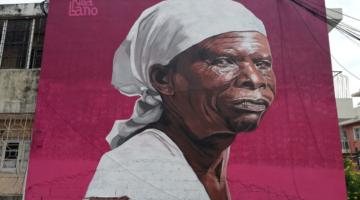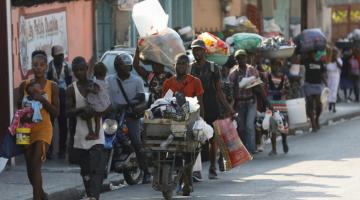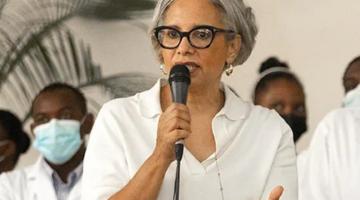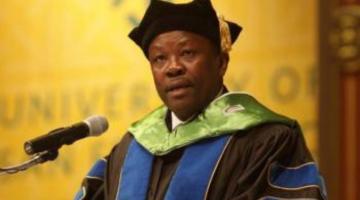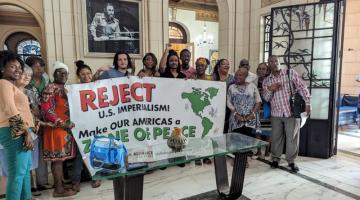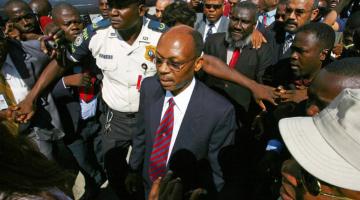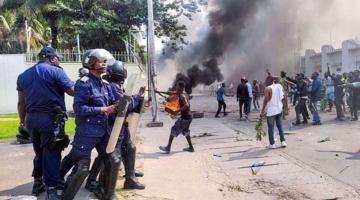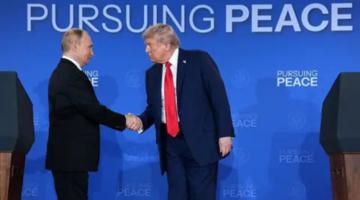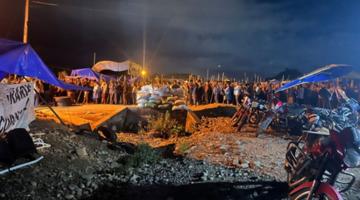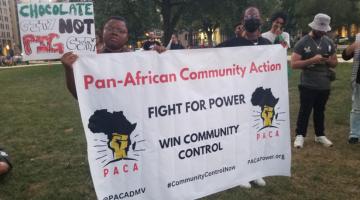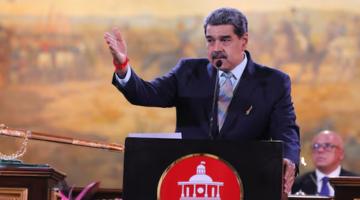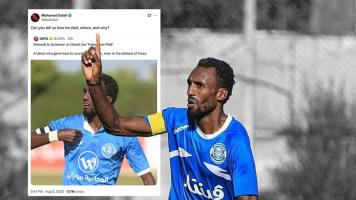MINUSTAH soldiers in Cité Soleil. Tereza Sobreira
Historian Everaldo de Oliveira Andrade asserts that armed groups are the heirs to the repression of US-backed dictatorships.
Originally published in Brasil de Fato.
Two decades after the creation of the United Nations Stabilization Mission in Haiti (MINUSTAH), the country is about to receive new foreign troops, this time led by Kenya. The justification given is the fight against criminal groups that control parts of the country and have led to an escalation of violence in recent weeks.
The violent episodes led to the resignation of Prime Minister Ariel Henry. The Haitian population is waiting for the appointment of a transitional government in the coming days, which will be made up of seven names chosen by agreement between Haiti’s political parties, the Caribbean Community (Caricom) countries and the United States.
For Brazilian historian Everaldo de Oliveira Andrade, author of the book “Haiti: dois séculos de história" (Haiti: Two Centuries of History, in a rough translation) (Alameda Editorial, 2019), the idea of foreign intervention means the repetition of violence against the Haitian population. "What is expected from such an intervention is to rebuild the instruments of imperial dominance, especially the United States, which treats Haiti as a third-class colony, always subordinate."
In an interview with Brasil de Fato, Oliveira emphasized the need for historical reparations to the Haitian population for the damages MINUSTAH has caused. "What is expected is that, first, the crimes that the UN, the Brazilian state and other states imposed on Haiti be recognized and, second, a restoration through compensation be agreed due to the violence and chaos caused by MINUSTAH's intervention over the last 20 years."
He also pointed out that the emergence of gangs in the country can be traced back to the political militias created in the 1950s during François Duvalier dictatorship, which lasted until 1986, when his son, Baby Doc, was in power.
"Despite MINUSTAH, many of these [criminal] groups moved to organized crime and continued to operate as auxiliary forces for political groups. Although many people say these are just criminal groups, they have links with political forces and also use these relationships to maintain part of organized crime. This is not something that has arisen now, but a decades-old issue. It is also the result of an attempt to dismantle people’s movements and prevent them from being able to act autonomously and independently."
Read bellow the full interview.
What does the deployment of a new international mission led by the UN mean for Haiti 20 years after the deployment of troops by the United Nations Stabilization Mission in Haiti (MINUSTAH)?
The question is what is expected of this intervention. Firstly, the idea of foreign intervention is, once again, violence against the Haitian population. What is expected from such an intervention is to rebuild the instruments of imperial dominance, especially the United States, which treats Haiti as a third-class colony, always subordinate. What is expected, first, is the recognition of the crimes that the UN, the Brazilian state and the other states that intervened in Haiti imposed on the country and, second, a restoration through compensation agreed upon due to the violence and chaos caused by MINUSTAH's intervention over the last 20 years.
If they want to help Haiti, let them help with real solidarity, sending food, teachers, and doctors and letting Haitians, through democratic elections, build a solution. Historically, the Haitian people have always had conditions and projects without outside interference to achieve their own independent, democratic and free alternative as a country. We have to start from the premise that Haitians have the [necessary] conditions because this violence and chaos are built from the outside.
These paramilitary groups – these gangs – are sustained by the interests of a small political and economic elite in Haiti, which is connected to foreign interests. Institutionalized violence and chaos are not intrinsic to the Haitian people. That's intentionally built. It is part of a decades-long policy to destroy the capacity of Haitians to build a democratic alternative for their country on their own. So, without this perspective, this new UN mandate, with soldiers from Kenya, Ghana, and wherever, is always based on the assumption that Haitians are unable to build a future of freedom and democracy for their country on their own.
The justification for establishing the new international mission is the activities of armed groups, which control a large part of Haitian territory. It was also the actions of gangs that prompted the creation of MINUSTAH 20 years ago. What is the origin of these groups?
There is a history of more organized armed groups emerging with the Tonton Macoutes, which was a militia created by François Duvalier – dubbed Papa Doc – at the end of the 1950s and consolidated in the 1960s. They were paramilitary militias and worked to impose their political regime and persecute opponents.
With the end, in 1986, of the dictatorship of Baby Doc (Papa Doc's son), several of these groups, which also had links with the army and the police, migrated to organized crime. But many continued to play a political role as an auxiliary force to the more conservative groups and acted to repress, for example, the popular groups that emerged, with Jean Baptiste Aristide, who expressed the popular struggle in the 1980s and 1990s. It also created a very strong political culture of articulation between political action and armed militias.
When Aristide was overthrown in the 2004 coup – when the United States and France overthrew him, kidnapped the president and imposed MINUSTAH – this continued. Despite MINUSTAH, many of these groups migrated to organized crime and continued to operate as auxiliary forces of political groups. This continues to this day. Although many people say they are just criminal groups, they have links with political forces and also use these relationships to maintain part of organized crime. This is not something that has arisen now, but a decades-old issue. It is also the result of an attempt to dismantle people’s movements and prevent them from being able to act autonomously and independently.
With the fall of the Papa Doc and Baby Doc regimes at the end of the 1980s, two major political wings emerged and Jean Baptiste Aristide expressed a reorganization, a resurgence of popular forces, mainly peasants and workers. Although divided into various parties, the members of the old regime had in common the maintenance of corrupted institutions, the dictatorship and the ever-important support of imperialism, especially the United States, France and Canada, which gave backing to these reactionary forces that always fought the possibility that the popular movements could express themselves as an independent political force or democratic alternative for the functioning of Haiti.
Looking at events in Haiti during the 20th century, we see that the country's trajectory has been marked by intense political crises aggravated by natural disasters. How does the combination of these factors explain the country's current political and economic scenario?
Natural disasters happen. In many countries around the world and in the Caribbean, natural disasters occur: Puerto Rico, the Dominican Republic, Jamaica, Cuba, the whole region. However, the economic and political impact is huge, but on the scale of Haiti, the political and economic impact is not directly due to natural disasters. These disasters show the political and economic fragility of the country, because if there is a protection network or a minimally active state with resources, it can cope with this combined with solidarity and everything else. Haiti's disintegration is not the fault of the Haitians, of course. It's the fault of imperialism's constant intervention to dismantle the country to prevent popular forces and democracy from being consolidated. Because there are unions, movements, churches and organizations in society that have always tried to build alternatives, but they have been fought against.
MINUSTAH shows the importance of the military and political intervention from outside the UN, through the United States, Canada and Brazil, imposed on Haiti by repressing its organizations. So, for instance, in the case of the 2010 earthquake, there was direct intervention by the United States, including over MINUSTAH and even over the Brazilian generals distributing resources, imposing a direction and privilging NGOs, privileging interests including those of US companies and other countries against the possibility of popular self-organization by the Haitian people.
In sum, the UN mission represented a hijacking of democratic possibilities for the Haitian population and politics. The presidents elected during the MINUSTAH period were so in a situation of fraud, manipulation and hardship for the population, workers and peasants to organize themselves autonomously and independently. It left a trail of destruction, a trail of repression.


